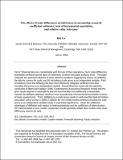The Effects of Scale Differences on Inferences in Accounting Research: Coefficient Estimates, Tests of Incremental Association, and Relative Value Relevance
Author(s)
Lo, Kin
Download555684.pdf (2.069Mb)
Metadata
Show full item recordAbstract
Firms' financial data vary considerably with the size of their operations. Such scale differences potentially confound
several types of inferences, of which this paper analyzes three. This paper evaluates two potential solutions to these
inference problems suggested by theory: (i) deflating the data by a proxy for scale; and (ii) including a scale proxy
as an independent variable. First, simulations show that deflating the data more effectively mitigates coefficient bias
than including that proxy as an independent variable. Reconciling this result with the opposing conclusion of Barth
and Kallapur (1996, Contemporary Accounting Research) reveals that the prior results depend on assumptions
that are economically and statistically unreasonable. Second, the deflation approach results in more accurate tests
of incremental association in terms of mean squared error. Third, deflating by a scale proxy results in well-specified
tests of relative association using Vuong's (1989) Z-statistic for non-nested models whereas including the scale
proxy as an independent variable results in overstated significance. Given the additional advantages of deflation
with respect to heteroscedasticity and the coefficient of determination (R2) demonstrated in prior studies,
researchers should generally deflate their models when scale differences exist in the data.
Date issued
2004-07-09Series/Report no.
MIT Sloan School of Management Working Paper;555684
Keywords
Econometric models, Capital markets, Financial reporting, Equity valuation